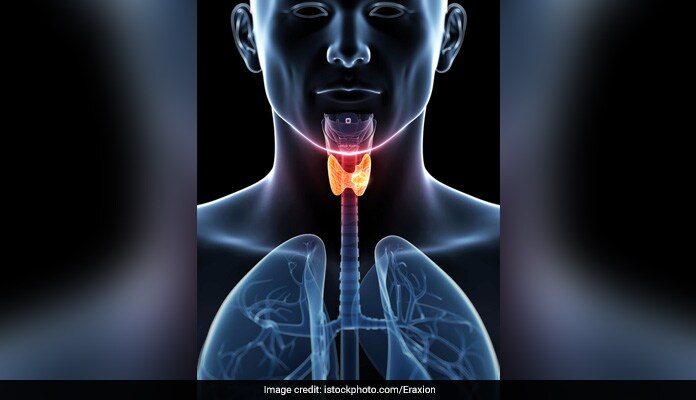World Thyroid Day 2018: When you are hypothyroid, your thyroid gland doesn't produce sufficient hormones. Here are the effective ways to deal with it and a hypothyroidism diet.

World Thyroid Day 2018: May 25 is observed as World Thyroid Day
HIGHLIGHTS
- Ensure adequate iodine intake to maintain your thyroid level
- Working out in a structured manner also helps in hypothyroidism
- Getting adequate sleep is very important when dealing with hypothyroidism
Usually women are at a bigger risk than men because of the big hormonal changes during events like pregnancy and menopause. If you are hypothyroid, there is no reason to believe that you are doomed to be overweight for life.
Read: 5 Common Causes Of Hypothyroidism
Provide support to your thyroid gland by adopting the following diet and lifestyles approaches and slowly your hormones will start falling in sync:
1. Nutritional approach : The thyroid gland requires iodine and an amino acid tyrosine to produce T3 and T4 with the support of vitamin B6, vitamin C, manganese and several others.
- Ensure adequate iodine intake, consume iodized salt, iodine rich foods include banana, carrots, strawberries, milk, whole grains, seafood, egg, yoghurt, pineapple etc.
- Include good sources of protein like paneer, cheese, milk, curd, egg, seafood, cereal-pulse combination to support production of T3, T4.
- Avoid processed foods. They are mostly high in sodium and disturb the sodium-potassium balance, and prevent iodine absorption.
- Avoiding gobi, cabbage, peanuts, soya etc is a myth. All of these including the entire cabbage family (cauliflower, cabbage, and broccoli) can be eaten cooked, avoid eating them raw. Peanuts and soya are a good source of protein, fibre and minerals and shouldn't be excluded unless you are allergic to them.
- Start vitamin supplements - B complex, C, D and E.
Also read: 8 Natural Treatments For Hypothyroidism
2. Exercise strategies : Exercise is non-negotiable but remember the following
- Cardio 2-3 times a week, cycling and swimming are great options.
- Weight training once a week to strengthen your muscles.
- Yoga is excellent; Sarvangasana is particularly beneficial for the thyroid gland.
- Work out in a structured manner but do not overdo exercise.
3. Get adequate sleep. An adequate and sound sleep rejuvenates each and every cell in the body, and maintains a sense of balance. Sleep deprivation puts more stress on the already overworked thyroid gland. Even exercise fails to benefit us if we don't sleep well. So get a restful 7-8 hours of sleep every night and you are ready to take on the challenges thrown at you every single morning. If possible sleep without setting your alarm. A person who can wake up on time, feeling fresh and energetic, without an alarm, is well-rested, recovered from previous stresses and has hormones in sync.
4. Love yourself more than anyone else (haha, most important), and prioritize your own body requirements and health. I am not asking you to be selfish and indifferent. Yet, it is important sometimes to put yourself first and say no to others. Listen to your body signals and give it rest when it asks for. Take time out for yourself and indulge in activities that give you relaxation and a sense of fulfillment.
So adopt these approaches to provide support to your thyroid gland, allow it time to recover, and restore hormonal balance. Do not expect overnight miracles. And focus on gaining health, not losing weight; weight loss will come as a side benefit along with better health, better energy, and an overall sense of well-being.
DoctorNDTV is the one stop site for all your health needs providing the most credible health information, health news and tips with expert advice on healthy living, diet plans, informative videos etc. You can get the most relevant and accurate info you need about health problems like diabetes, cancer, pregnancy, HIV and AIDS, weight loss and many other lifestyle diseases. We have a panel of over 350 experts who help us develop content by giving their valuable inputs and bringing to us the latest in the world of healthcare.














